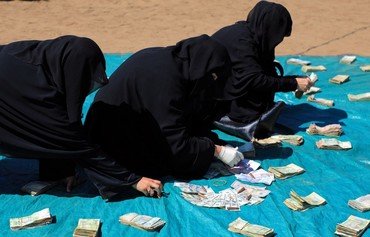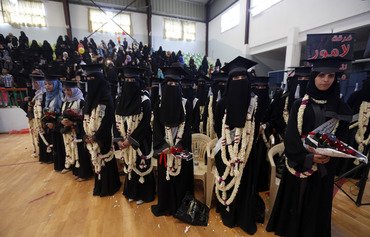The Houthis' (Ansarallah) drain on Yemen's state funds and the related salary disbursement crisis has led to a further decline in living conditions in the conflict-ridden country, officials and analysts tell Al-Mashareq.
The current financial situation has exacerbated the suffering of state employees in particular, the majority of whom rely on their monthly salaries to obtain basic food needs for their families, and has forced many into debt, they said.
In August, a UN report revealed that the Iran-backed Houthis were diverting about $100 million each month from the Central Bank in Sanaa, and that foreign reserves had dwindled to $1.3 billion from about $4 billion in November 2014.
The revelation prompted an immediate halt in the payment of state salaries in Sanaa and other regions under the control of the Houthis and their allies.
It also prompted President Abd Rabbu Mansour Hadi to relocate the Central Bank to Aden, where his government is temporarily based.
In September, Prime Minister Ahmed Obeid bin Daghr announced his government's commitment to pay the salaries of all state employees following the decision to relocate the Central Bank to Aden.
"The government has taken a number of measures to rescue the Yemeni economy from collapse as a result of the tampering by the Houthi coup militia and forces [of former President Ali Abdullah] Saleh," he said.
Hadi decided to relocate the Central Bank out of awareness of his responsibility "towards all Yemenis", he said, after the Houthis suspended employee salaries and stopped covering the operational costs of government institutions.
Civilian state employees have not received their monthly salaries for September and October, while army personnel have not received their salaries for three months (August to October).
Yemeni soldier Saleh Hussein told Al-Mashareq that not receiving his salary for three months has put him in a tight bind.
He has had to borrow money and use credit at some shops, he said, while at other times he has had to sell some of his wife's gold jewelry "to buy basic food needs, which are almost depleted".
Government beginning to resolve crisis
On November 6th, the Ministry of Finance in Sanaa issued a directive to put in place procedures for the disbursement of salaries to state employees based on available funds, local media reported.
Under this directive, Ministry of Defence employees were to be paid full salaries for the month of August, and key personnel in public service units were to be paid 50% of basic salaries and legal allowances for the month of September.
Additionally, it said, 50% of pension payments due to civilian, military and security services retirees should be paid for the month of September.
Yemen's salary disbursement crisis can be attributed to the Houthis' tampering with state institutions in Sanaa, Centre for Economic and Social Development Studies director Marzouk Abdel-Wadood told Al-Mashareq.
"The Houthi takeover of state institutions, including the Central Bank, is the reason Yemen has reached this difficult stage and a major reason for the deterioration of economic conditions, including the salaries disbursement crisis," he said.
The Central Bank's decision to relocate from Sanaa to Aden was "a wise decision given the depletion of foreign reserves", he said, and was designed to preserve whatever value the Yemeni riyal still has against hard currencies.
Salaries to be disbursed 'within days'
"Within days at the most, salaries will indeed be disbursed in most government facilities in Sanaa," said Fouad al-Thari, director general of financial affairs at a public sector company in Sanaa.
The disbursement of half salaries is a "a positive step" because employees have "reached hard times and rely on their salaries to buy their basic food needs", he told Al-Mashareq.
Economist Abdul Jalil Hassan described the decision to relocate the Central bank to Aden as "a good gesture worthy of praise", but noted that half a salary may not be very helpful as so many people are in debt.
"[The salaries] will be pursued by debtors coming out from every corner who want to collect their debts before others, such as landlords awaiting accumulated due rents, food merchants, grocery store and pharmacy owners, and others," he told Al-Mashareq.
The government must continue its "commitment to disburse salaries and alleviate the difficult and harsh conditions people are living under and the on-going human suffering", he said.

![ATM machines in Sanaa are without customers amid the country's ongoing financial crisis. [Abu Bakr al-Yamani/Al-Mashareq]](/cnmi_am/images/2016/11/10/6534-Yemen-atm-machines-600_384.jpg)







We want updated news day after day, i.e. new news every day.
Reply1 Comment(s)